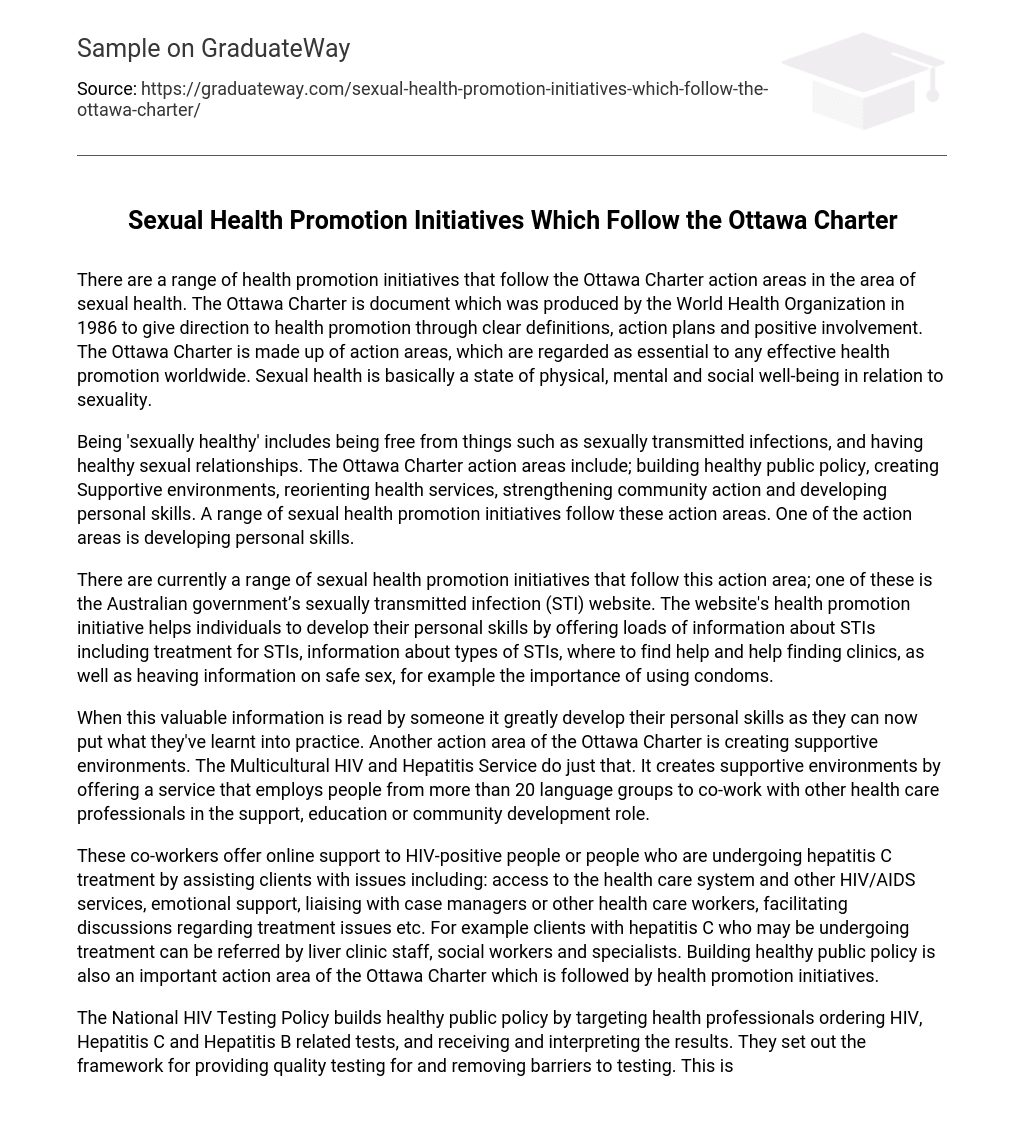There are a range of health promotion initiatives that follow the Ottawa Charter action areas in the area of sexual health. The Ottawa Charter is document which was produced by the World Health Organization in 1986 to give direction to health promotion through clear definitions, action plans and positive involvement. The Ottawa Charter is made up of action areas, which are regarded as essential to any effective health promotion worldwide. Sexual health is basically a state of physical, mental and social well-being in relation to sexuality.
Being ‘sexually healthy’ includes being free from things such as sexually transmitted infections, and having healthy sexual relationships. The Ottawa Charter action areas include; building healthy public policy, creating Supportive environments, reorienting health services, strengthening community action and developing personal skills. A range of sexual health promotion initiatives follow these action areas. One of the action areas is developing personal skills.
There are currently a range of sexual health promotion initiatives that follow this action area; one of these is the Australian government’s sexually transmitted infection (STI) website. The website’s health promotion initiative helps individuals to develop their personal skills by offering loads of information about STIs including treatment for STIs, information about types of STIs, where to find help and help finding clinics, as well as heaving information on safe sex, for example the importance of using condoms.
When this valuable information is read by someone it greatly develop their personal skills as they can now put what they’ve learnt into practice. Another action area of the Ottawa Charter is creating supportive environments. The Multicultural HIV and Hepatitis Service do just that. It creates supportive environments by offering a service that employs people from more than 20 language groups to co-work with other health care professionals in the support, education or community development role.
These co-workers offer online support to HIV-positive people or people who are undergoing hepatitis C treatment by assisting clients with issues including: access to the health care system and other HIV/AIDS services, emotional support, liaising with case managers or other health care workers, facilitating discussions regarding treatment issues etc. For example clients with hepatitis C who may be undergoing treatment can be referred by liver clinic staff, social workers and specialists. Building healthy public policy is also an important action area of the Ottawa Charter which is followed by health promotion initiatives.
The National HIV Testing Policy builds healthy public policy by targeting health professionals ordering HIV, Hepatitis C and Hepatitis B related tests, and receiving and interpreting the results. They set out the framework for providing quality testing for and removing barriers to testing. This is quite effective public policy being built because of the fact that in the policy also gives individuals information about the certain STI’s which they are being tested for and therefore also satisfies the actions area of developing personal skills.
Reorienting health services is another action area of the Ottawa charter. A great example of a health promotion initiative related to sexual health that follows the action area is P. A. C. T (the Partnership Approach to Comprehensive Testing). The P. A. C. T is a partnership between the AIDS Action Council, the Canberra Sexual Health Centre and the ACT Division of General Practice. The partnership also includes Youth in the City, Sexual Health and Planning ACT, adult services and sex industry businesses, and community organisations.
These reoriented health services aim to make clinical testing services more relevant and accessible by taking them out to the community. The clinics are a free service and are held at times and places convenient to the target groups. The last action area of the Ottawa Charter is strengthening community action. This action area is followed by many health promotion initiatives including World AIDS Day. World AIDS Day is one of the most globally recognised events of the year.
On 1 December each year World AIDS Day is celebrated across Australia to raise awareness in the community about the issues surrounding HIV and AIDS. The day strengthens community action by encouraging all Australians to be aware of the prevalence of HIV/AIDS and to take action to reduce the transmission of HIV by promoting safe sex practices as well as accepting individuals living with or affected by HIV/AIDS. As the World AIDS Day website states, “HIV positive people need to be empowered in society.
They have the right to participate in a community free from stigma and discrimination”. As you can see there are a range of health promotion initiatives that follow the Ottawa Charter action areas in the area of sexual health, and by following the Ottawa Charter action areas, successful and effective sexual health promotion initiatives are developed and carried out to inform Australian individuals about the importance of maintaining good sexual health.





